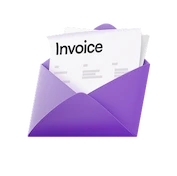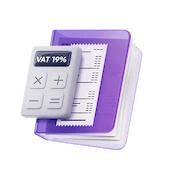Einfach, unkompliziert und günstig. Ich bin total zufrieden und hätte schon viel früher wechseln sollen.
Bestes Geschäftskonto 2025
Digitale Registrierung, Sofort-Überweisungen, hohe Zinssätze und alle Finanz-Tools die du brauchst. Wähle ein Konto, das zu deinen Ambitionen passt!
Trustpilot: Hervorragend! | Über 20.000 Bewertungen
Auszeichnungen & Erfolge
Geschäftskonten von Vivid im Vergleich

Bestes Geschäftskonto 2025
Finanzfluss.de

Höchster Zinssatz für Unternehmen 2025
Für-Gründer.de

Bestes Mobile Banking 2025
Handelsblatt.com

Deutschlands Top-Startups 2024
LinkedIn
Die Komplettlösung für Unternehmen & Selbstständige
Mach mehr aus deinem Geld
Sichere dir den höchsten Sonderzinssatz aus dem Ranking des Magazins "Für Gründer"! 4 % Jahreszins auf die ersten vier Monate und danach, je nach Tarif, bis zu 2% p. a.* Dein Geld wird von uns in qualifizierte Geldmarktfonds investiert, um Zinsen zu generieren. Mehr zum Thema Zinsen hier.

Vertraut von über 500.000 Kunden in ganz Europa
Echte Bewertungen und Bewertungen. Unabhängige Bewertungen und schnelle Akzeptanz zeigen, warum Einzelpersonen und Unternehmen Vivid wählen. Bewertungen ab September 2025.
4,6
Trustpilot-Wertung
Bewertet mit „Ausgezeichnet“ – 4,6/5 von über 20.000 Bewertungen.
4,5
App Store
4,5/5 aus 16.000+ Bewertungen für die App „Vivid Business & Personal“.
24/7
Kundenservice
Menschlicher Support, Tag und Nacht.
Das schätzen unsere Kund:innen
Tarife für jedes Unternehmen
Am besten für wachsende Firmen mit mehr Aktivität und erweiterten Anforderungen – hält schnelle Teams in Sync
- Loslegen
Free Start
Perfekt für neu registrierte Firmen, die Finanzen aufsetzen und zentrale Banking-Funktionen kostenlos testen
0 € / Monat
Immer kostenlos- Konten & Zinsen
- Kostenlose Konten mit einzigartigen IBANs12
- Anfänglicher fester Zinssatz p.a.*4%
- Zinssatz p.a. nach 4 Monaten*0,1%
- Karten & Cashback
- Garantiertes, unbegrenztes Cashback0,1%
- Cashback auf ausgewählte Kategorien und Marken – bis zu2%
- Virtuelle & physische KartenKostenlos
- Ausgabenlimit für Werbeanzeigen und IT-DiensteUnbegrenzt
- Überweisungen
- SEPA InstantAusgehende: 5 gratis pro Monat, weitere 0,1 €
- Eingehende SWIFTKostenlos
- Ausgehende SWIFT5 €
- Support
- 24 Stunden täglich persönlicher SupportJa
- Loslegen
Basic
Ideal für kleine Unternehmen mit regelmäßigen Umsätzen, die solides Alltagsbanking zu kleinem Preis wollen
7 € / Monatohne MwSt.
2 Monate kostenlose Probezeit- Konten & Zinsen
- Kostenlose Konten mit einzigartigen IBANs15
- Anfänglicher fester Zinssatz p.a.*4%
- Zinssatz p.a. nach 4 Monaten*0,5%
- Karten & Cashback
- Garantiertes, unbegrenztes Cashback0,25%
- Cashback auf ausgewählte Kategorien und Marken – bis zu4%
- Virtuelle & physische KartenKostenlos
- Ausgabenlimit für Werbeanzeigen und IT-DiensteUnbegrenzt
- Überweisungen
- SEPA InstantKostenlos
- Eingehende SWIFTKostenlos
- Ausgehende SWIFT5 kostenlos pro Monat, dann 5 €
- Support
- 24 Stunden täglich persönlicher SupportJa
- Loslegen
Pro
Am besten für wachsende Firmen mit mehr Aktivität und erweiterten Anforderungen – hält schnelle Teams in Sync
19 € / Monatohne MwSt.
2 Monate kostenlose Probezeit- Konten & Zinsen
- Kostenlose Konten mit einzigartigen IBANs20
- Anfänglicher fester Zinssatz p.a.*4%
- Zinssatz p.a. nach 4 Monaten*1,3%
- Karten & Cashback
- Garantiertes, unbegrenztes Cashback0,5%
- Cashback auf ausgewählte Kategorien und Marken – bis zu6%
- Virtuelle & physische KartenKostenlos
- Ausgabenlimit für Werbeanzeigen und IT-DiensteUnbegrenzt
- Überweisungen
- SEPA InstantKostenlos
- Eingehende SWIFTKostenlos
- Ausgehende SWIFT10 kostenlos pro Monat, dann 5 €
- Support
- 24 Stunden täglich persönlicher SupportJa
- RechnungsstellungKostenlos
- Unterlagen für die Buchhaltung beizufügen (bei kostenpflichtigen Plänen)Unbegrenzt
- Software-Verknüpfungen (Lexware Office, DATEV, ...)Kostenlos
- Geschäftsreisen: Cashback bis zu30%
- Crypto Earn-Erträge bis zu8 % effektiver Jahreszins
- Gebühr für den Empfang von Kartenzahlungen von Kunden (EEA-Karten), ab0,79% (+0,25 €)
- Firmendepot (Aktien, ETFs, Krypto)Kostenlos
Privatkonten für Führungskräfte und Teammitglieder
Mit Vivid behältst du gleichzeitig den Überblick über Geschäftskapital und privates Geld - auf einer einzigen Plattform. Nutze das volle Potenzial unserer Konten: profitiere von Cashback auf Kartenzahlungen, hohen Zinsen auf nicht investiertes Geld und einer großen Auswahl an Investmentoptionen und ETFs.

Dein Geld ist in guten Händen

Sichere Anlage
Dein Geld wird in Vermögenswerten wie Einlagen bei der Zentralbank von Luxemburg und hochwertigen, qualifizierten Geldmarktfonds angelegt, die von BlackRock und anderen Gesellschaften verwaltet werden. Anders als herkömmliche Banken verwenden wir die Gelder unserer Kund:innen nicht für die Vergabe riskanter Kredite.
Überwachung durch europäische Finanzbehörden
Alle unsere Dienstleistungen werden von der Vivid Money-Gruppe selbst angeboten: Die Vivid Money S.A. steht unter der Aufsicht der Commission de Surveillance du Secteur Financier (CSSF) in Luxemburg und die Vivid Money B.V. wird von der niederländischen Finanzmarktaufsicht (AFM) reguliert.
Schutz im Fall unserer Insolvenz
Wir halten dein Geld von unserem getrennt. In dem unwahrscheinlichen Fall einer Insolvenz der Vivid Money S.A. oder Vivid Money B.V. bleibt das Geld unserer Kund:innen sicher — auch über Beträge von 100.000 € hinaus. Das Guthaben auf deinem Konto gehört ausschließlich dir.

Zahlungssicherung
Wir schützen deine Daten bei Zahlungsvorgängen mithilfe international anerkannter Sicherheitsstandards für Kreditkartenzahlungen.

Zwei-Faktor-Authentifizierung
Mit 3D Secure und zweistufiger Authentifizierung stellen wir sicher, dass keine Zahlung ohne deine Genehmigung erfolgt.

Datenschutzstandards
Unsere Server befinden sind innerhalb der EU, um die Einhaltung der Datenschutz-Grundverordnung zu garantieren.











